Personal
Portfolio
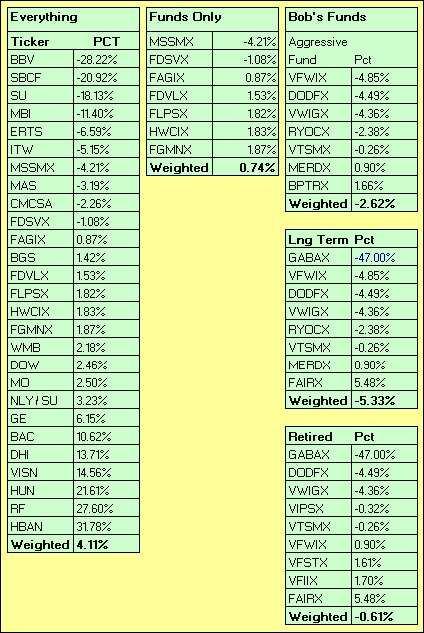
|
It
has been an interesting month and it appears that once again, having
the right stocks in reasonable allocations is a great way to increase
the portfolio in these turbulent times.
As I thought,
the regional banks are picking up a bit of steam. Next I
think the insurers will have to participate and for those I settled on
XL and MBI. MBI I am not so sure about, but I think it will be
very beneficial to own XL long term.
This month I am taking a
look at NLY (Annaly Capital Management) in some detail.
Caution, if you look the company up using annaly.com,
ensure you use two 'N's
in the url and not just one. You might set yourself up for a bit of a surprise.
This
is also a good time to expound a bit on gold since I am getting tired
of all the commercials on TV and over the radio.
In a nut
shell, I think owning a small percentage of gold as an inflation
hedge is one thing. Owning it as an investment is quite another.

|
|
Personal Portfolio
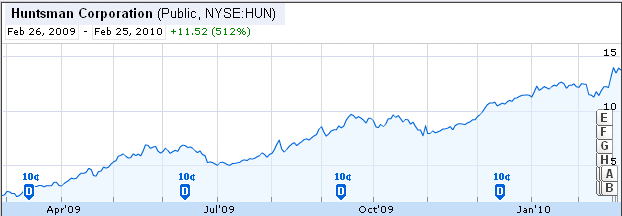
Once again, Huntsman does not fail to disappoint. It's like the Energizer Bunny - it just keeps on going. Up.
However, it went over 10% of the portfolio - again.
So, in the interest of diversity it looks like time to go shopping.
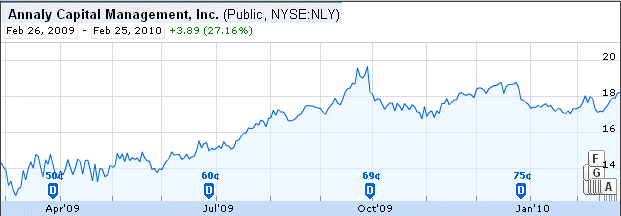

There
has been a lot of noise regarding rat's (Real Estate Investment Trusts)
the last few months and since I don't have one, I decided
to do some research and came up with Annaly Capital Management.

This
on fits the bill. It has a large market cap, it has been paying
out dividends forever and is currently yielding around 17%. The
company pays out large distributions and has a beta of less than 5.
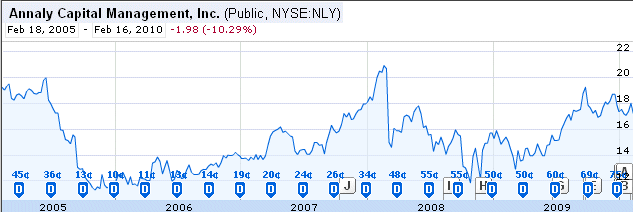
This does not appear to be a trading stock but it does look like it has some room for share price appreciation.
I also liked their web site and their commentary. Quite Insightful.
I
can hear noise in the background to the effect that this is a really
stupid idea because the company deals in mortgage backed securities
(MBS) and collateralized mortgage obligations (CMO's). Haven't I learned anything?
To that I would say Maybe, Maybe Not.
Let's look at the Investor FAQ:

There
is a notation that the company also uses leverage to increase returns.
More leverage means more risk. Let's have a look at the
investor FAQ again:
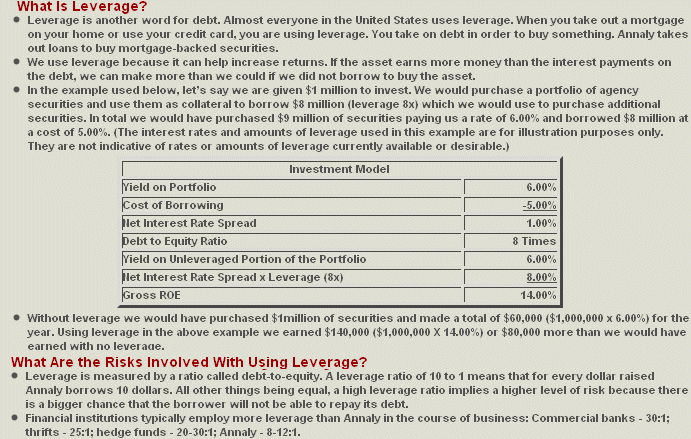
To
me, the amount of leverage involved is reasonable. I think this
is worth an investment in at non-taxable account so I ended up investing about 2% of the
portfolio in this security. Dividends are taxed at the stock owner's marginal rate.
We'll see how this works out.
I'm sure I will hear about it if it doesn't.
A Fact sheet for the Company.
Anything Else?
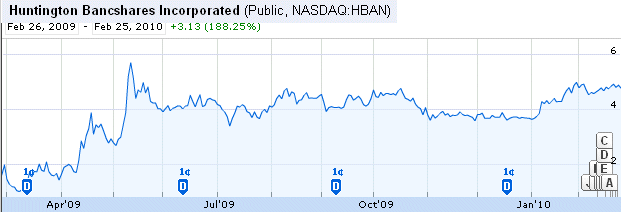
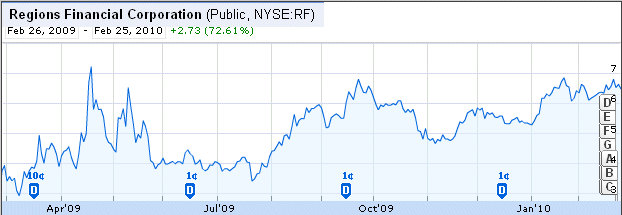
I
still think adding a couple regional banks to the portfolio for the
long term is a good idea and I think Huntington BancShares and / or
Regions Financial would be a reasonable choice.
If you like to do a little trading, you can gradually increase your shares.
It would be pretty hard not to do so, given the volatility of the regionals.
I
noticed a couple months ago Cramer highlighted HBAN and it actually did
not crater the shares after that short, one time run-up which generally
follows a Cramer pick. I think that was because no one really
bought the recommendation in the first place.
And another thing......you are going to have to have some patience.
And what about Gold.....
I
am getting rather tired of all the advertisements on the radio where
someone is either trying to buy your gold or sell their gold to you.
For
this month's listening enjoyment I have included a 1/2 hour long
radio commercial extolling the virtues of gold ownership to anyone who will
listen.
In the World According to Me, why would I want to own Gold and what flavour would I want to own?
Lets look at the various ways to own gold.
You can own:
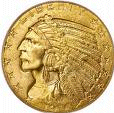
Numismatic Coins
Numismatic Coins are coins issued by a government as currency and many of these coins are considered collector's coins.
Pros - None in my view , unless you happen to get lucky or perhaps you enjoy collecting coins.
Cons
- Of all the various ways to own gold, this is by far the most
expensive. Markups can range from modest to very high, most tending to
the very high range. I would not buy gold coins without a lot of
research.
If I really wanted to buy gold coins, I
would pay a professional numismatist with no skin in the game an hourly
fee to assist with the endeavor. He would steer me clear of the
numerous pitfalls I doubtlessly find along the way and get me into
something that I would be comfortable with, knowing I made a reasonable
investment at a reasonable price.
I would be very wary of those on the radio and TV hawking their gold wares, trying to scare me silly with the doom and gloom talk.
Oh,
and don't forget is you are going to own gold coins, you are going to
have to store gold coins which for me, would be in a safe deposit box
at a bank. Unless your bank account comes with a free safe
deposit box, ensure you deduct your yearly deposit box fee from
any potential gains you may have made in the value of your coins.

Bullion Coins and Bars
Bullion coins are coins issued sometimes by governments and other times by private companies with government sounding names.
Bullion
coins intrinsic value is the weight of the gold. A one-ounce bullion
coin is worth the price of whatever gold trades for on a given day.
Bullion Bars intrinsic value is the weight of the gold as well. It is worth whatever gold is currently trading for.
Pros - They don't have near the markup that numismatic coins do.
Cons - You also need a place to store them and to store them safely, it is going to cost.
If
you really want bullion, it pays to shop around. The commission
on a Canadian Maple Leaf will not be the same as a Kruggerand or a
Chinese Panda. Unless you are collecting and Reallly want that Panda, gold is gold. Purity should be practically identical.
Why pay more if you don't have to.

Gold Mutual Funds and Gold ETF's
Gold
Mutual funds own shares of stock in companies mining gold. These
are generally actively managed, which means you are paying a management
fee and since these funds are considered sector funds, those fees can
be higher than what you might expect.
Pros - You don't have to store mutual funds or ETF's in a safe deposit box.
Cons
- You are investing in a very narrow sector of the economy. The
means funds can be quite volatile and because this is a specialized
sector, the management fees can be quite special as well. For
this reason I would go with the lowest cost, which would be the ETF.
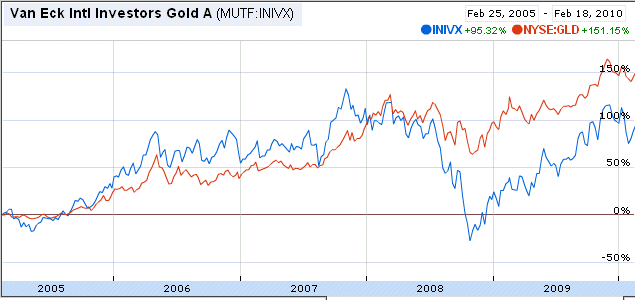
There is a considerable spread in the returns of Van Eck - the mutual fund, and GLD - the ETF. Now why would that be.....

Which
one would you buy? Always look at the fees. The mutual fund
takes $5.75 off the top from every $100.00 you invest and also charges
another 1.45% as a yearly management fee. The ETF charges
.4%. Period. That should sound like the better deal. If you disagree with that, get an unbiased opinion from another source, not your broker.
Gold Stocks
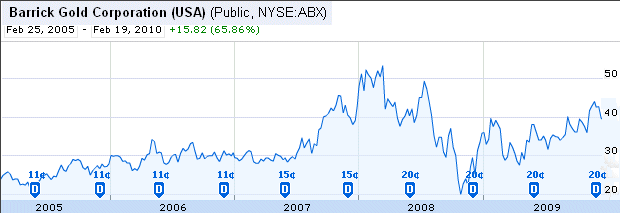
Buying gold stocks in a gold mining company is another way to invest. This is Barrick Gold, one of the largest.
Pros - You don't have to store stocks in a safe deposit box.
If you reinvest dividends you can end up ending more shares of the company.
If you invest in one gold coin or one
bar, at the end of the day you still have one gold coin or one
bar.
Purchasing shares of stock is the cheapest way to own gold.
The only thing you are paying is the trading fee and if you are
using a discount trading firm like
Schwab, that fee is about $9.00 at trade. Compare that against
the markups for coins, bullion or the
management fees for funds.
There is no comparison.
Cons - Like
any other company, gold stocks can have good years and bad years.
Some cannot survive a steep decline in the price of
gold without
drastically cutting back and some can. Equipment breakage,
environmental issues and ineffective management are
just a few issues which can
affect the bottom line.

Here's
a personal example. My average cost for Suncor last year was
about $29.00 a share. Amazingly enough, it is at
about the same share price 7 or 8 months later.
How could that be?
It's
called FIRE at one of their largest upgrading facilities. The
company will not be back to full operation until the May - June
time frame.
It had a substantial impact on the share price.
By the way, if you want to buy an oil stock, the price is quite attractive.
Here are my two biggest problems with gold as a long term investment:
1. Over the past 30 years what do you suppose the total rates of return have been for:
a. The S&P 500?
b. US Treasuries?
c. Gold bouillon?
This may look obvious, but the answer is one the hawkers of gold will never mention on TV or the Radio:
a. The S&P 500 - 2300%
b. US Treasuries - 1090%
c. Gold bouillon - 29%
Sound look a great investment opportunity to you?
2. Gold stocks and gold funds have automatic leverage built into them.
Leverage
can increase your gains and and your losses by amazing percentages.
What causes this is the spread between the cost of an ounce of gold on
the market and what it costs to mine it.
Using round numbers, say gold costs $1000.00 to buy an ounce on the market.
Let's
also suppose Gold Company A runs a highly efficient mining operation,
has very high grade ore and can extract one ounce of gold for $700.00
an ounce.
That's a difference of $300.00 an ounce, which is pure profit for the mining operation.
Now
say there is panic in the streets because the Teleprompter shot off his
mouth once again and at the end of the day gold at market costs
$1200.00 an ounce.
Gold Company A is now reaping in
$500.00 an once, which is a pretty good haul. This amounts to a 66% or
so profit for the company off the 20% increase in the spot price of
gold when the Teleprompter broad casted across the networks. Again.
An
index fund tracking the S&P 500 has a Beta of 1, which is a measure
of volatility against its tracking index. A Beta of 1 means the fund
will track the index in either direction 1 for 1.
Gold stocks over time, are the equivalent of specialized funds which try to leverage their gains X 2
against their index. In this case it's the price of gold stocks against
the actual price of gold. Gold increases 10%, gold stocks go up
20%. Same thing for the downside.
Are you really interested in that kind of volatility in a portfolio, go for it as long as you know what you are getting into.
This not only applies to gold, but to other commodities as well.
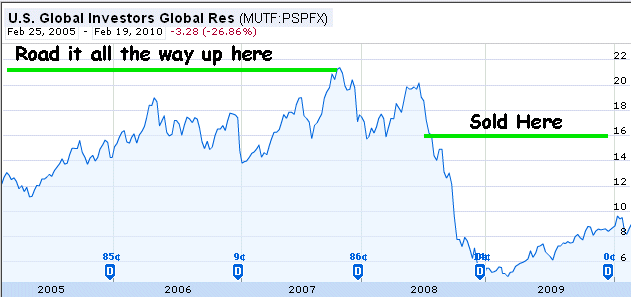
One
fund I had for a long time was PSPFX, a commodities fund. Made a
lot of money with it. However, there was the potential to lose a
boatload too.
Fortunately I understood the leverage
involved and bailed out once I came to realize the market was probably
going to continue tanking in a big way. Those less fortunate got
led like lambs to the slaughter.

Compare
this the losses in 2008 of this fund vs the losses in your portfolio
during the same time. If your losses matched the losses of PSPFX,
you really should have a look at what you own and your asset
allocations to same.
What about using gold as a hedge against inflation?
How about using property, oil, or a more diversified commodity fund, ETF or ADR instead.
What about using gold stocks or funds to leverage your overall returns?
Sure. For maybe 4-5% of the portfolio if you feel really brave.
Just be aware that leverage works both ways and even the Pros don't get it right every time.
Comment from John, who more or less agrees:
I
agree with most of your comments about gold. I own gold bullion for
more than just an investment. If the whole financial network goes down
or is taken over, what are you going to do. The value of a dollar will
be zero. Gold and silver will have value. It's like keeping some cash
on hand just for insurance. If the banks are all closed, you can access
your money.
By having some cash, gold, or silver on hand,
you're never left out in the cold. Now I was never one to even think a
run on the banks was possible in this day and time but from what has
happened in the last 24 months, I'm not so sure any more.
Gold and silver bullion may not be a great investment, but it can be great insurance.
~ Yes, you do have a point there. Just don't pay too much for that 'insurance'.
Wasn't there a time when science was supposed to be sacred and above the political fray?

Not anymore, apparently.
|

The start of another fine wintry day. |
|


